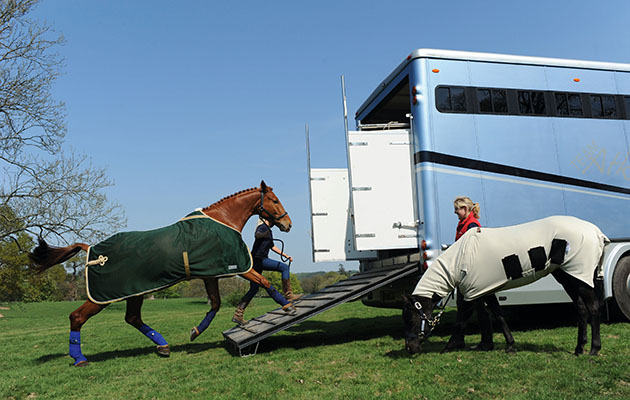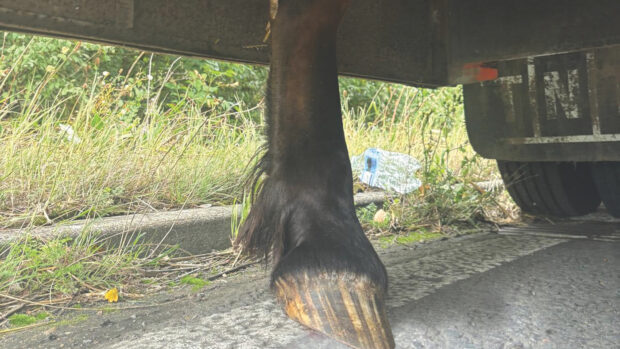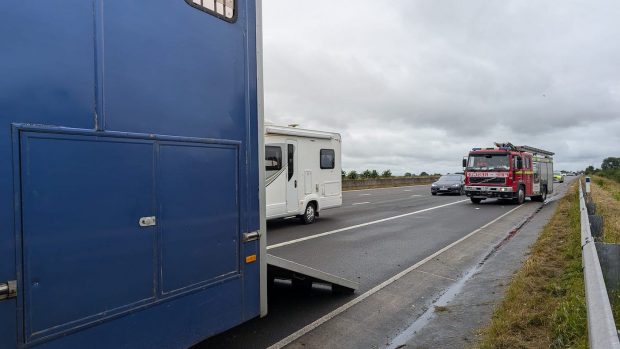Jason Webb of Australian Horse Training is a renowned UK-based horse trainer with a passion for starting young horses, solving equine problems and teaching riders of all abilities and ambitions develop and strengthen the partnership they have with their horses. Here Jason helps one H&H forum user with a loading and travelling problem after an incident on the road that knocked his confidence
Q: Travelling a horse after an accident: “I’m looking for some advice. My horse has always been fine travelling. He started playing up loading a little bit but would always go on with some carrots and a bit of pressure. He had always had good journeys up until recently when I took him to the vets for a lameness work up which resulted in hock injections. He travelled fine on the Monday — the transporter said he didn’t make a peep and I followed behind, but then we picked him up on the Friday (this time I travelled with him) and we had a bit of a trauma.
“I knew he wasn’t quite right when I went to load him as he went into rearing straight away even without pressure — usually rearing is his way of having a tantrum if I don’t quite release quick enough when he moves forward. I managed to get him on but he was stressed from the word go, kicking and striking out and then as soon as we got on the motorway he started rearing. On the final time he went right up and put his foot on the anti-weave grill and got stuck. Luckily the transporter pulled straight over and with a bit of brute force we managed to get him down; and fortunately the grill gave way. He was visibly very stressed, was dripping in sweat and shaking. I called the vet and they came within 20 minutes and gave him a fair whack of sedation and we managed to get him back safely.
“He is now back to normal (this happened around two weeks ago), but we are looking towards summer shows and booking transport to go once a month to a local riding club around 20 minutes drive away. I can hack there but it’ll take around an hour and a half. So my question is do I dare travel him again? When do you think is too soon to start travelling again? Should I leave him until the start of the show season (April) and then just try then or get something booked in monthly for some practice — short 10 minute drives building up to 20 mins for example?”
A: Ground work is the key here.
There are gaps in your ground work if your horse is reluctant to load and rears when you insist on a forward movement. The two most important pieces of ground work for transporting a horse are movement and patience. Getting your horse to stay calm and consistent when being moved forwards, backwards, left and right is something that can always be improved whether it be on our part or the horse’s.
The simple task of a horse standing patiently is not as easy as you think. If you stood still for five minutes holding your horse would they start to fidget or annoy you? If the answer is yes than your horse hasn’t learnt to switch off enough. To teach this I start with tying up first — I have a great exercise I do which is called standing on the tie, it’s easy and very effective. You can full training videos on these topics on my online training resource Your Horsemanship: www.yourhorsemanship.com
Continued below…
Related articles:
Loading
You might be wondering why your horse was worse coming home from the vets than normal. It’s not because your horse has been treated badly. Your horse has a low tolerance threshold. This means that they will only put up with so much before they revert to their survival instincts fight, flight or freeze (fff). Each horse has a natural tolerance level some high, some low. This needs to be taken into consideration but it is important to realise it can be improved through correct handling.
Unfortunately, while your horse has been at the vets, he’s been given injections and moved into unfamiliar places etc. Then taken out after days of this and expected to do something else he’s not that keen on, loading and travelling calmly. This was the last straw and can bring on the type of behaviour you experienced. It’s what I call an accumulation effect.
I hear this time and time again with people taking their horses out. They load (“after a small hesitation”) at home and won’t load to come back. It doesn’t make sense to a lot of humans but to the horse, loading again is too much and they let you know!
Travelling
One of the rules of training horses is that they remember the last thing they did.
So if a horse is stamping their feet on the box and trying to jump over you when you take them off then they will associate that behaviour as the answer to being let off the box.
Another fact of training horses is that when they’re put somewhere they don’t want to be, their survival instincts will be their first option before they become thoughtful and look for another alternative. This is why things can get worse before they get better. The trick is to take them off the box when they’re calm. This tells the horse that their flight instincts are not helpful in this situation and they will be taken off the box if they relax and wait. If you groundwork is good and you repeat this process you will overcome loading problems and travelling problems.
It’s not always easy to do, I know. I’ve been there when a horse “kicks off” and your every being is saying get them out. From a training point of view this isn’t going to help but I don’t want a horse to injure themselves or their handler either. This is why all training should be done with process in mind. The first few trips I do, I take all the partitions out so if they do panic I know there is nothing in there that can injure them and often they settle a lot more the more space you give them. I can then be confident if they become unsettled that I can wait until they calm down before taking them off.
I have loading training videos on www.yourhorsemanship.com along with all the preparation work.

Jason Webb
For more information on Jason Webb and his online training base Your Horsemanship, where you can learn a foundation in horse training with online lessons in groundwork, starting, and ridden fundamentals, visit his website





